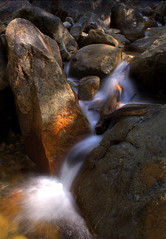Dried Grass - Joshua Tree National Park (December 2005)

I was playing with macro again recently, and this is one of the results. We all like results.
As an aside, with the new year coming around, I'd like to take this opportunity to share some of my enlightenment with my readers by suggesting a new hobby to take part in. That hobby is listening to early choral music.
Now, I know we all come from different musical backgrounds, and for some people choral music is about as interesting as looking at dried grass (even if it is dried grass from a national park). This is because choral music, like most classical music, requires a certain amount of work to understand and appreciate. But, if an individual makes that effort, they could very well come to appreciate choral music far more than any modern music.
Don't get me wrong, there's a time and place to enjoy Ashley Simpson's music, too. Wait, no, no I'm fairly sure there isn't really. Ever. And I won't apologize for saying that. And if you've actually purchased an Ashley Simpson CD, then I believe you're the one who needs to apolo...
But I digress. Ashley Simpson's music, as structured and intellectual as it is, will never compare to pieces by the likes of Thomas Tallis, Josquin DesPrez, or Johannes Ockeghem, et al. These were musical masters whose works are more complex than you CAN EVER IMAGINE!!!!
Ok, no, too much melodrama. But they are very complex, not to mention beautiful.
I'm firmly convinced that the most beautiful piece of choral music ever written, and you're welcome to disagree with me on this, is Thomas Tallis's "Spem in Alium" (Sing and Glorify). I've only recently discovered this piece for myself, and have been so inspired by it that to not share it here would be a monstrous crime.
Not an ordinary crime, but a crime against humanity. My sovereign nation would be invaded all "shock-and-awe" and my dominion overthrown by the likes of some guy who bears a startling resemblance to a monkey.
Anyway, yes, "Spem in Alium." This is the perfect place to begin delving into choral music. You can hear a brief snippet at Amazon.com as performed by the Huelgas Ensemble on their recording "Utopia Triumphans."
Just click here and find -----> "Spem in Alium"
(and I now realize that you have to listen to the windows media player or the amazon music sampler version of it. The realplayer version starts at some incomprehensible midpoint in the piece which is not at all ideal for the first-time listener.)
Also, keep in mind that the sound quality you will hear is nothing close to the CD quality. Hopefully, it will be enough for your curiosity to be so well-piqued that you'll be unable to resist buying the CD on the spot so you can hear the music in crystal clarity. And, you've always wanted to think of yourself as "cultured." Well, now you'll be well on your way, just like yoghurt. They'll call you Dr. Bifidus...
(furthermore, I now realize that there is an MP3 recording of the beginning of the piece with much better sound quality and set in English rather than Latin, here):
"Sing and Glorify"
Of course, there's plenty more music where that came from, so if you would like a full, or at least fuller, education on early choral music then I recommend reading this helpful guide by an Amazon.com user:
So you'd like to discover composers better than J.S. Bach
And Happy New Year to you. Enjoy the new hobby.




18 Comments:
Happy New Year to you as well and thank you for suggesting coral music. i admit that i am unfamilar of this genre of music but i'll surely listen to it. All the best for 2006 and may you continue posting these fascinating pictures:)
Now, this presents an interesting question, because I assume, being from Pakistan, that you're Muslim (and I've read your blog). This music I've suggested for everyone is very old Christian church music. I don't expect that would be a problem for you, but I'm interested in seeing what you think of it.
I love the music of Tallis, but I will have to disagree that "Spem" is his greatest work. I put a vote in for Lamentations or If ye Love Me. I can go back to those for years.....
True, both excellent works. What draws me to "Spem" over those is its incredible complexity.
She's Jessica Simpson's even more profoundly talentless little sister.
Oh, and it's strict unaccompanied choral music.
you're right, that would be interesting. Though finding coral music here would be a challenge on its own but i'll definitely listen to it. I almost wish i could ask you to listen to some of our classical music but is in either Urdu or Punjabi and not easily available outside Pakistan.
Well, let me know if you find any that is readily available online, I'm always up for trying new things.
I can't believe you used the words structured and intellectual in reference Ashley Simpson. One can only assume you are being sarcastic.
yes, and one would be correct in that assumption.
I am trying to find some website where you can listen to our classical music. One particular genre is called qawali and Nusrat Fateh Ali Khan was one of our internationally renowned musicians. He even played a duet with Peter Gabriel and worked with Martin Scorsese. You can look him up on the Internet. And arent Simpson sisters supposed to American sweethearts of sort?
I guess superficially they are supposed to be American sweethearts, but they aren't very well-liked sweethearts. Ashley, in particular, might even be despised.
I managed to find some clips of Nusrat's music on Amazon.com, and it's pretty remarkable. I'll definitely try to get some full recordings.
upon reading Mr (or Ms.) Johji's informative amazon page about early choral music i've gotta throw up a little red flag. i really do appreciate his efforts to expand the public's knowledge of less-known choral music, i must disagree with his reasoning for claiming that the renaissance (and pre-ren.) composers such as josquin, tallis, et al, were 'better' than bach simply by sheer weight of their counterpoint or the fact that bach tirelessly studied their works in honing his own craft. i resolutely reject the claim that 40-voice counterpoint is necessarily harder to write, or results in a more well-crafted piece of music than some of Bach's 4-part fugues. this kind of thinking dismisses one of the most important ingredients in truly ingenious music: the balance of style and study. what made bach a genius (an even greater genius than his predecessors?) was that he found a way to balance the intellectual complexity of the previous generations, with the grace, elegance, and humanity of his own generation. bach was what i consider a genius of the highest order for another reason: he was a "renaissance-man", just like you, Marty! He didn't just sit at his desk and write out 40-part fugues, but he also could sit at the organ and improvise on a hymn tune for over two hours in the styles of the French, the Italian, his friends, his teacher, and yes, even Palestrina, etc. He could play the violin beautifully, and he could dream up a soprano aria that will break your heart. all this while instructing an orchestra and a room full of teen-aged boys to play his new "cantata of the week" , every week. i suppose this brings us to the question of what entails true genius. but i would say that what makes bach so enduring, maybe more so than the composers of the 16th c, was his command of so many musical styles from so many generations. plus his ability to weave them in and through his own work with such facility. i hate feeling as thought i'm on a band-wagon as much as the next guy, so i must give caution to those who would embrace old music just because it's old, or 'complex'.
on the other hand, i completely agree with your assesment of the choral music of Thomas Tallis. completely breath-taking!
Thanks Tim, I actually wondered as I was writing the above post what your thoughts on it would be since you're considerably more well-versed on music than I am, to use mild understatement.
To quote the author of that guide though, "Really is there such a thing as the Greatest Composer - isn't that a narrow minded concept to start with?" While his title implies he thinks these earlier composers are better, I think it's primarily a tool to get people to read what he has to say rather than his foundational viewpoint on the subject. So, yes it's good to throw up the red flag, but hopefully what people will take from reading that guide is a broader knowledge of who these earlier composers were, rather than a feeling of psuedosupremecy over those silly Bach lovers.
In his closing paragraph he states:
Are any of these composers 'better than Bach'? You have to decide that for yourself - although perhaps the who's better than who game ultimately is a bit of a dead end, there is no longer any way that Bach, any more than Josquin, can be naively declared the 'Greatest of all Time' without a thorough understanding of the background to his music that made it all possible.
True. I think what really got me going, however, was simply the point that this commentator seemed to base his high esteem for earlier composers solely on the complexity of their counterpoint. "If you marvelled over the complexity of Bach's four voiced counterpoint try just getting your mind around the fact that here you find 12 voice, 24 voice - right up to 40 voice counterpoint!" .... "a phenomenally complex canon cycle that progresses section by section from double canon at the unison, second, third, fourth etc all the way up to the octave. The sheer staggering complexity of it all makes [Bach's] the Art of Fugue seems pretty simplistic by comparison" ... I think that if one is to make comparisons between the music of Bach and his predecessors, one must take into consideration all the factors that make both kinds of music special; especially when introducing this music to novice listeners. That being said, I do hate to jump on the Bach bandwagon. Oh well, perhaps one day we WILL discover a composer who outreached Bach.
Ah, I see. Number of voices does not necessarily equal more complex or better style. It does make sense, and a modern-day correlation could be drawn between the music of a Britney Spears, which is certainly very overly-produced and dare-I-say-it complex in that manner, but if compared to the music of a Tori Amos or Fiona Apple, it simply cannot hold a candle to their styles.
Post a Comment
<< Home